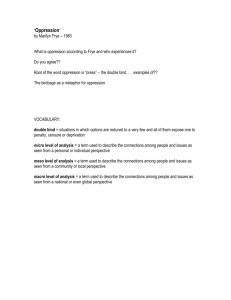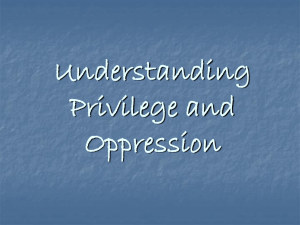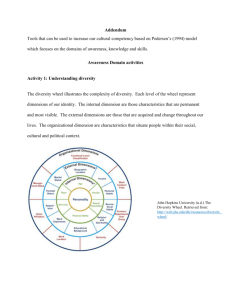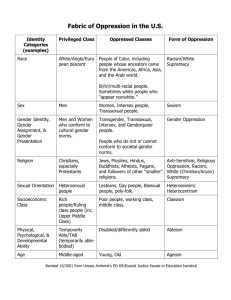SOWO 501 Spring Semester, 2011 Tuesdays, 9:00 – 11:50 a.m.
advertisement
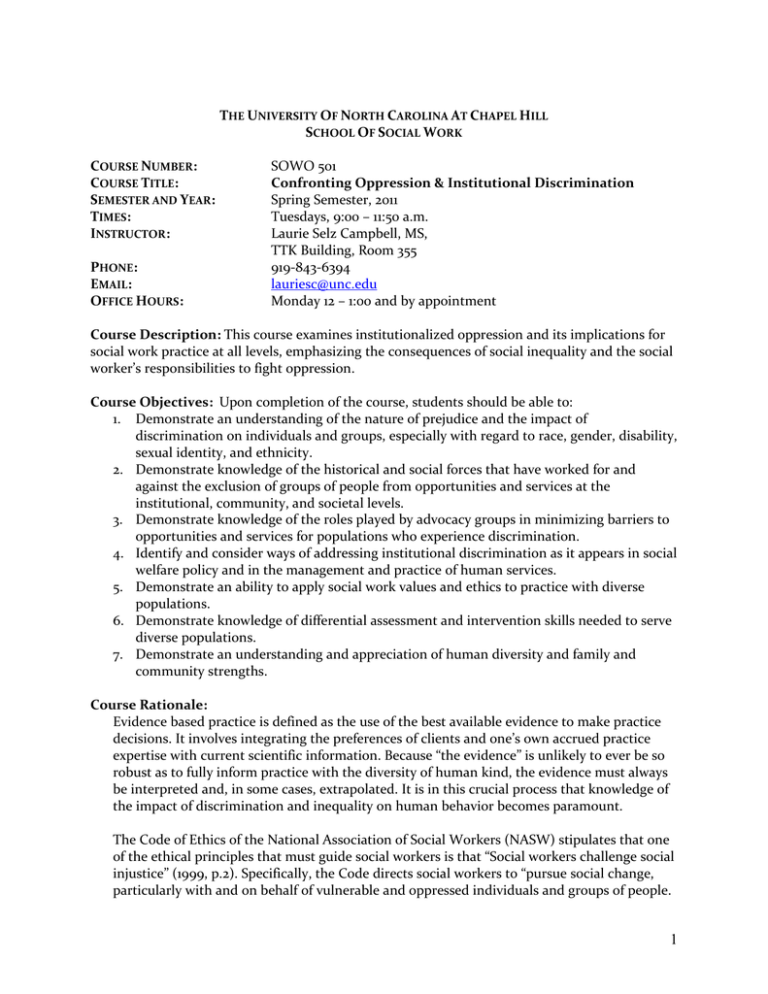
THE UNIVERSITY OF NORTH CAROLINA AT CHAPEL HILL SCHOOL OF SOCIAL WORK COURSE NUMBER: COURSE TITLE: SEMESTER AND YEAR: TIMES: INSTRUCTOR: PHONE: EMAIL: OFFICE HOURS: SOWO 501 Confronting Oppression & Institutional Discrimination Spring Semester, 2011 Tuesdays, 9:00 – 11:50 a.m. Laurie Selz Campbell, MS, TTK Building, Room 355 919-843-6394 lauriesc@unc.edu Monday 12 – 1:00 and by appointment Course Description: This course examines institutionalized oppression and its implications for social work practice at all levels, emphasizing the consequences of social inequality and the social worker’s responsibilities to fight oppression. Course Objectives: Upon completion of the course, students should be able to: 1. Demonstrate an understanding of the nature of prejudice and the impact of discrimination on individuals and groups, especially with regard to race, gender, disability, sexual identity, and ethnicity. 2. Demonstrate knowledge of the historical and social forces that have worked for and against the exclusion of groups of people from opportunities and services at the institutional, community, and societal levels. 3. Demonstrate knowledge of the roles played by advocacy groups in minimizing barriers to opportunities and services for populations who experience discrimination. 4. Identify and consider ways of addressing institutional discrimination as it appears in social welfare policy and in the management and practice of human services. 5. Demonstrate an ability to apply social work values and ethics to practice with diverse populations. 6. Demonstrate knowledge of differential assessment and intervention skills needed to serve diverse populations. 7. Demonstrate an understanding and appreciation of human diversity and family and community strengths. Course Rationale: Evidence based practice is defined as the use of the best available evidence to make practice decisions. It involves integrating the preferences of clients and one’s own accrued practice expertise with current scientific information. Because “the evidence” is unlikely to ever be so robust as to fully inform practice with the diversity of human kind, the evidence must always be interpreted and, in some cases, extrapolated. It is in this crucial process that knowledge of the impact of discrimination and inequality on human behavior becomes paramount. The Code of Ethics of the National Association of Social Workers (NASW) stipulates that one of the ethical principles that must guide social workers is that “Social workers challenge social injustice” (1999, p.2). Specifically, the Code directs social workers to “pursue social change, particularly with and on behalf of vulnerable and oppressed individuals and groups of people. 1 Social workers' social change efforts are focused primarily on issues of poverty, unemployment, discrimination, and other forms of social injustice” (NASW, 1999, p.2) These activities are anchored to one of the fundamental missions of the social work profession, which is to “strive to end discrimination, oppression, poverty, and other forms of social injustice” (NASW, 1999, p.1). The intent of this course is to prepare students to fulfill their responsibilities related to fighting injustice and oppression, as prescribed by the Code. All social workers have a responsibility to meet the needs of diverse client systems in our society; therefore, all social workers must have knowledge and understanding of the structures, systems, and policies that create and maintain institutional oppression. The focus is on special population groups that should be understood in the context of not only problems that often accompany their particular status, but also from the richness of their heritage and the potential for their beneficial contribution to society. This course serves as a foundation for the understanding of the nature, character, and consequences of being excluded or left out of many available opportunities and services. This course explores the implications and connections of discrimination for oppressed groups, including racial and ethnic minorities, women, older persons, people with disabilities and gay, lesbian, bisexual, and transgendered (GLBT) people. The common denominator for all of these groups is the fact that they have been constantly affected by social, economic and legal biases—they have been victimized by institutional structures and social policies that maintain and perpetuate their oppression. Required Texts: Adams, M. et al., eds. (2000). Readings for diversity and social justice. New York: Routledge. [hereafter referred to in the syllabus as Adams] Carlton-LaNey, I. (2005). African Americans aging in the rural south: Stories of faith, family and community. NC: Sourwood Press, Inc. Additional readings will be posted on Blackboard. Teaching Methods and Expectations: Teaching methods will include lecture and class discussion, as well as multimedia presentations, guest speakers, and experiential activities. My perspective is that we all have much to learn AND much to teach. Full participation is essential to your learning process in the class, and will allow you to successfully apply the course material in a way that is personally and professionally meaningful. The class will ask you to personally reflect on issues and material that may not always be comfortable. We will discuss early on the concept of “safer space,” and will generate some guidelines that will allow all of us to engage authentically, and to treat each other with respect, compassion, and honor. Your regular attendance is critical to your learning, as well as to the atmosphere of inclusiveness and trust in the class. I ask that you contact me, in advance, if you will miss a class. Any student with significant difficulty with class participation requirements should 2 speak with me at the beginning of the semester so that alternative forms of contribution can be identified. Assignment Descriptions: Descriptions of the course assignments are below. We will discuss further guidelines and resources as we move through the semester. Assignment 1: Analysis Paper On Crash Based on your viewing of Crash, you will submit a 5-7 page paper that reflects your understanding and application of concepts of privilege, oppression, classism, and racism to the film. Specific questions to be addressed will be provided. Assignment 2: Community Meeting Attend a community meeting or event of a population subgroup other than your own. You have a wide range of choices for the meeting or event – for example, you may choose a church service, AA meeting, concert, play, dance production, or advocacy group meeting. It is essential that you attend alone. Then, in 2-3 pages, please describe the meeting or event, and reflect on your experience of attending. What did you take from this event that may help you to better understand the experience of difference and/or marginalization? Assignment 3: Personal Reflection Paper On Privilege and Oppression This 5-7 page paper will ask you to reflect personally on your own experiences of privilege and oppression, and to identify areas of strength and potential growth in the evolution of your social work practice. The paper is meant to be a personal narrative, and, therefore, should be written in first person. Further guiding questions will be provided. Assignment 4: Team Presentation on Alliance & Just Practice with Oppressed Persons This 20-30 minute presentation will be completed in teams of 3-4 students. You are free to use PowerPoint or other media to communicate your message to the class. Detailed guidelines will be provided, but the following is a broad overview of what will be asked of each team: 1. Identify a focus population. You are free to focus on a population of persons that we have discussed in class, or to identify another group of interest to you. Then, using the scholarly literature as your foundation, address the following questions: 2. How has this group been treated historically in our culture? 3. What assumptions, beliefs, or attributions appear to drive the oppression or discrimination of this group? 4. What are examples of specific oppressive or discriminatory practices that this group has encountered as they interact with various institutions? You may include social, economic, educational, faith and health care institutions in your discussion, as well as any others of relevance. 5. What are the outcomes or implications of these experiences for? Consider the range of bio-psycho-social-spiritual outcomes and others of relevance. 3 6. What are implications of these oppressive practices for the social worker who works with individuals from this population? What are 2-3 specific understandings or actions that you see as crucial to supporting non-oppressive practices with the group you have chosen? Assignment 5: Alliance & Just Practice Individual Paper This 3-5 page paper is to be written on the same group that was the focus of your team’s presentation, above. Based on (a) your emergent knowledge of how privilege and oppression have played out for you personally, and (b) the scholarly research that you completed for the team presentation, you will reflect on your own strengths, limitations, and areas for evolution in terms of future practice with the group. As always, additional guidelines will be provided. Grading System: Points will be assigned as follows: Analysis paper on Crash Community Meeting Personal reflection paper on privilege & oppression Alliance & just practice team presentation Alliance & just practice individual paper Participation Total 20 10 20 25 15 10 100 points Grades will be assigned as follows: 94 - 100 80 - 93 70 - 79 <70 H P L F Policies on the Use of Electronic Devices in the Classroom: I expect that we will all be invested in creating a learning environment of respect and engagement. I welcome the use of laptops in class for taking notes or completing small group tasks. However, I ask that you use them only for relevant activities – not for checking email or surfing the Web. During class, cell phones and other devices should be silenced. Accommodations for Students with Disabilities: Students with disabilities which affect their participation in the course should notify the instructor if they wish to have special accommodations in instructional format, examination format, etc., considered. Accommodations and services are provided by Disability Services (Voice/TDD 962-8300; 966-4041). Learning Disability Services (9627227) provides supportive services for students with learning disabilities and attentiondeficit/hyperactivity disorders. Policy on Academic Dishonesty: 4 Academic dishonesty is contrary to the ethics of the social work profession, unfair to other students, and will not be tolerated in any form. All written assignments should include the following signed pledge: “I have neither given nor received unauthorized aid in preparing this written work.” In keeping with the UNC Honor Code, if reason exists to believe that academic dishonesty has occurred, a referral will be made to the Office of the Student Attorney General for investigation and further action as required. Please refer to the APA Style Guide for information on attribution of quotes, plagiarism, and appropriate citation. Policy on Incompletes and Late Assignments: Late assignments are strongly discouraged, but may be accepted in some cases. All assignments are due at the beginning of class on the day noted. You must contact me prior to a due date if you would like to request an extension, or you will lose 10% of the assignment’s points per day (including weekends and the date on which the assignment was due, if submitted after the beginning of class). Incompletes may be granted if (a) there are extreme and unforeseeable circumstances that affect your ability to complete the semester’s work, and (b) you meet with me in advance to develop a plan and timeline for completing your work. Assignment Guidelines: All written assignments must be typed and follow APA format. Several writing resources are posted on the SSW website. You can also refer to the APA Publication Manual (6th edition), and to a tutorial on APA style at http://www.lib.unc.edu/instruct/citations/apa/index.html. 5 Course Outline Date Topics Readings Jan 11 Introduction Safer space Beginning to grapple with oppression None Jan 18 Core concepts: - Identity & social location - Privilege - Intersections of oppression - Internalized oppression - Being an ally Adams: Section 1, Conceptual Framework, pp. 1-60. Jan 25 Core concepts (continued) Classism Adams: Section 7, Classism, pp, 379-406 Feb 1 Racism Adams: Section 2, Racism, pp. 61-120. Feb 8 Race & ethnicity Heritage gallery Posted on Blackboard: Tatum, B. D. (1997). Why are all the black kids sitting together in the cafeteria? New York: Basic Books. Chapter 2: The Complexity of Identity Chapter 8: Critical Issues in Latino, American Indian, & Asian Pacific American Identity Development Due Posted on Blackboard: McIntosh, P. (1990). White privilege: Unpacking the invisible knapsack: Independent School. 49(2), 31-35. Johnson, A. G. (2006). Privilege, power, and difference. Boston: McGraw Hill. Chapter 3: Privilege, Oppression, & Difference Chapter 8: How Systems of Privilege Work Preparation for In-Class Activity: Please bring an expression of your heritage for display and discussion. This can be an artifact, food, glossary of terms, tradition, a performance, an art form—anything that comes from your group identity. Feb 15 Viewing & discussion of film “Crash” Posted on Blackboard: Johnson, A. G. (2006). Privilege, power, and difference. Boston: McGraw Hill. Chapter 5: Making Privilege Happen Chapter 7: Privilege, Power, Difference, & Us Chapter 9: Getting Off the Hook: Denial & Resistance Feb 22 Sexism Adams: Section 4, Sexism, pp. 199-260. Mar 1 Heterosexism Adams: Section 5, Heterosexism, pp. 261-318 Analysis of Crash 6 Date Topics Readings Mar 8 Mar 15 Due Happy Spring Break!! Religious oppression Adams: Section 2, Anti-Semitism, pp. 133-198 Posted on Blackboard: Levine. J. (2001). Working with victims of persecution: Lessons from Holocaust survivors. Social Work, 46(4), 350-360. Hodge, D. (2002). Does social work oppress evangelical Christians: A “new class” analysis of society and social work. Social Work, 47(4), 401-414. Mar 22 Oppression of persons with disabilities Adams: Section 6, Ableism, pp. 317-378. Mar 29 Ageism Carlton-LaNey, I. (2005). African Americans aging in the rural south: Stories of faith, family, and community. NC: Sourwood Press, Inc. Note: We will divide the chapters among class members. Community meeting paper Posted on Blackboard: Carlton LaNey, I. (1992). Elderly black farm women: A population at risk. Social Work, 37(6), 517-523. Apr 5 Apr 12 Working for Social Justice: Becoming an Ally Adams: Section 8, Working for Social Justice, pp. 447-498. Socially Just Practice Posted on Blackboard: Sue, D.W. & Sue, D. (1999). Sociopolitical considerations of trust and mistrust in multicultural counseling and therapy. In Counseling the culturally different: Theory and practice (pp. 27-49). New York: John Wiley. Posted on Blackboard: Johnson, A. G. (2006). Privilege, power, and difference. Boston: McGraw Hill. Chapter 10: Becoming Part of the Solution Personal reflection paper due Additional reading to be posted (just practice & cultural trauma). Apr 19 Presentations: Supporting Oppressed Groups Apr 26 Presentations: Supporting Oppressed Groups Individual paper due 7

